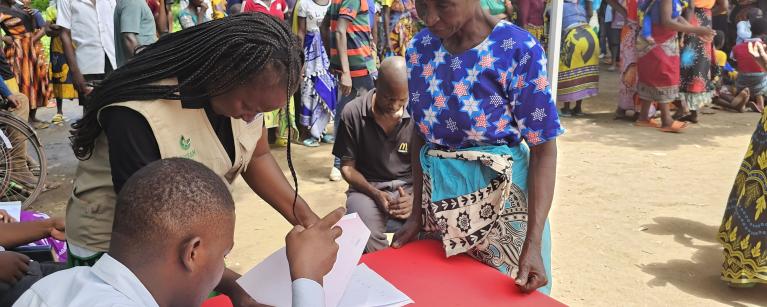Oxfam in Malawi with funding from Scottish Government Humanitarian Emergency Fund (HEF) through Oxfam Scotland is delivering once-off cash transfers to more than Eight Thousand drought affected people from 1,800 households in Nsanje district. With a total budget of MK324 million, each targeted household is receiving MK140 thousand cash transfer to enable them buy food and other basic household needs.
This follows unprecedented food security crisis exacerbated by El Niño-induced weather extremes like prolonged drought and flooding and economic challenges that Malawi particularly vulnerable communities are facing. The Malawi Vulnerability Assessment Committee reports that 5.7 million people, 28% of the country’s population, are experiencing acute food insecurity with 5.3 million in Integrated Phase Food Classification (IPC) phase 3 and 416,000 in IPC phase 4.
La Niña weather conditions, which followed El Nino’s, characterized by delayed rainfall across the country coupled with soaring food inflation has led to astronomical maize and food stuffs price increases making it unaffordable for many poor households to afford necessities for their families.
Nsanje is among the hardest hit districts in the country with half of its 194,924-population facing IPC 3 and 4 conditions hence Oxfam’s response. Most of the recipients of the cash transfers are households that had not yet recovered from the effects of Cyclone Freddy that hit the country in 2024.
"The money I have received today will enable me to buy at least 25 kilograms of maize, pay school development fund for my daughter and buy some other household basic needs," said Beatrice Asikoti one of the recipients from Sumbani village in the district. She adds: “I moved to a new location about a year ago after fleeing flood-struck Makhanga area. I am still trying to settle and make a life for myself and my family. It's not easy though because most of us are new and we must go to other villages for piece works survive”.
Oxfam in Malawi Country Director, Lingalireni Mihowa says the support from the Scottish Government is timely, however, more support is still needed to reach more people that are in dire need of food.
“For the eight thousand plus people that we have reached, the once off cash transfers is a relief from the stress they have been going through to afford a meal a day because maize prices, the country’s staple, is out of reach for many”, says Mihowa adding that a majority are yet to harvest something from their gardens because the rains delayed and were marred by prolonged dry spells.
“More support is needed, and we need to build communities’ resilience to climate shocks through investments in climate smart agriculture, irrigation technologies, asset building and other economic empowerment initiatives to enable vulnerable people, particularly women smallholder farmers produce attain food and nutrition security in the face of climate change”.
Dominic Mwandira is the District Commissioner for Nsanje and he says: “The district has so much potential, but it is grappling to recover from climatic shocks that affected the communities such as Cyclone Idai, Cyclone Ana, Cylone Gombe, and Cyclone Freddy in the past four years. Currently, 59% percent of the population in Nsanje district are food insecure.”
Oxfam has worked with Nsanje District Council and humanitarian and governance structures to identify 1,869 women, 2,262 girls, 1,763men, and 2,206 boys from Traditional Authority Mlolo that have benefitted from the response.
For further details and request for interviews, please contact Veronica Mwale through vmwale@oxfam.org.uk or 0995 22 11 44
